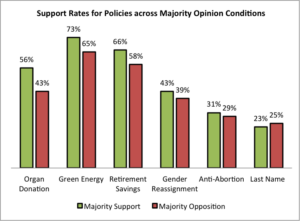Can you be nudged to like policies? Possibly yes, if other people like them too…
What leads people to support or oppose government policies? On some issues people certainly have strong beliefs, sometimes driven by their ideologies or the values they hold. But what about policies people do not have immediate strong feelings about?
As Harvard Law Professor Cass R. Sunstein and I show in a recent paper, it turns out that people’s feelings about policies depend a lot on what they think other people believe.
But are people’s judgments similarly susceptible to social influences? Will people’s opinion concerning governmental policies shift in response to information about what most other people are thinking?
Our recent study shows that across a wide variety of issues, the answer is yes: People shift their views after learning that the majority supports or opposes a certain policy. In our study, we surveyed hundreds of Americans with diverse political views. We divided them into two groups that were presented with identical policies. The only difference was that one group was asked to assume that most people supported each policy, and the other was instructed to assume the opposite: that most people opposed the policy.
Results showed that in multiple contexts, people were significantly influenced by what most other people were thinking. For example, when asked whether they supported a policy presuming that new drivers consent to be organ donors unless they actively indicate otherwise, 56% of the participants supported the policy when told that most people supported it, while only 43% supported it when informed that most people opposed it. In a variety of areas, including: retirement savings, green energy, obesity, and fuel efficiency, support rates were meaningfully affected by people’s perception of the majority opinion, sometimes turning minority support into majority support, or vice-versa.

This figure shows the differences in support rates across policies under the ‘majority support’ and ‘majority opposition’ conditions. The green bars show the percentage of supporters when people were told that most Americans supported the policy, whereas the red bars show the percentage of supporters when people were told that most Americans opposed it. The differences in support rates across three of these policies (organ donation, green energy, and retirement savings) are statistically significant (at the 5% or 10% level).
The findings reveal that people often adjust their policy judgments to the majority, shifting their views in its direction. The reason seems straightforward: When people are uncertain about what they should think, they often defer to the wisdom of the crowds. This is especially true with policy issues that people do not have a clear and well-formed opinion about.
Yet, we find evidence that in domains where people have clear convictions, the opinion of the majority matters less and sometimes not at all. In policies related to abortion and gender reassignment, for example, people are not significantly moved by the majority position.
Sometimes people may even move in the opposite direction. For example, people who supported governmental paternalism increased their support of a ban on smoking when they were told that most Americans opposed it. These findings suggest that disclosure of social norms can sometimes backfire, leading people in a minority position to strengthen their commitment to their original beliefs.
But the general message here is that policymakers who wish to build support for certain policies or tools can use the majority opinion to attract people to their position. In fact, this tool is already extensively used in the marketing world. This is probably why Coca Cola is “the drink everybody knows” and why “everyone loves Starbucks.” In short, beware: You could be nudged to like nudges (and possibly bans too), just as easily as you could be nudged to like sugary drinks.

By Meirav Furth-Matzkin
Harvard Law School, S.J.D. candidate
